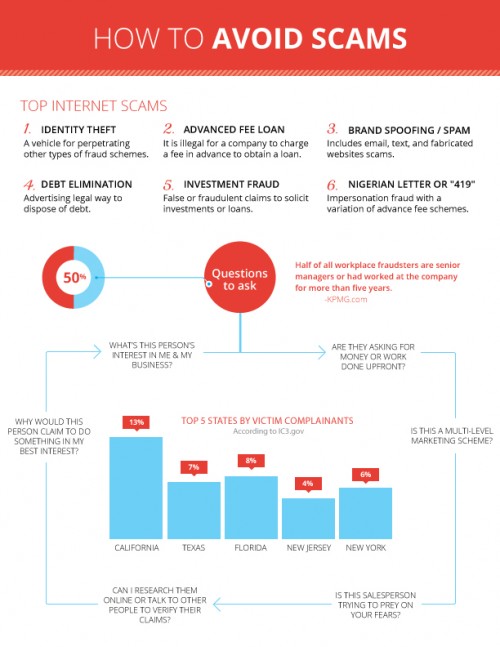Download the PDF of the Avoiding Scams Cheat Sheet here.
Business owners are constantly pitched on a wide variety of products and services. Unfortunately, many of these are scams and a business owner needs to be able to tell how to avoid scams to stay in business. You may have an excellent business model, lots of revenue and success, but if someone scams you that can set you back or possibly even cause you to go out of business. It is very important in business to never let your guard down against potential scammers. A scam can come from anyone: a relative, a trusted friend, a salesperson, an employee, a client, or almost anywhere else. Anytime someone is wanting or taking an action or requesting money for something there is a chance they may be scamming you. Be conscious and aware of this and always think things through very critically. Do not be afraid to ask tough, rude questions to make sure that you are not going to get scammed.
Key Questions To Ask To Avoid Being Scammed:
- What is this person’s interest in me and my business?
- Are they asking for money or work done upfront?
- Is this a multi-level marketing scheme? MLM’s are almost ALWAYS scams. If a business says you can make $XXX by signing up your friends and family to buy our service and then they sign up their friends and family… yup you are being scammed.
- Is this salesperson trying to prey on your fears? Are they saying you need life insurance because you will die soon? Yup a scam.
- Do I know this person or company? Can I research them online or talk to other people to verify their claims?
- Is this person claiming to do something in best interest but I don’t really know why they would?
Common Scams To Watch Out For:
- Tech support scam – if “tech support” for a company calls you, force them to verify themselves.
- Money transfer scams – people want you to send them payment for an item upfront online. Wiring money is like giving cash, once its gone you can’t retrieve it. Never pay for an item online unless you can verify the seller.
- Online penny auction scams – hey you can buy a $1,000 television for $20? Awesome! But wait… why would they give away a television? Sadly there is no free lunch and they are scamming you with their auction structure. Avoid.
- Email spam – unsolicited emails selling products from unknown vendors.
- Text message spam – same as email spam
- Identity theft scam – carefully monitor you and your business’s credit reports for signs of fraudulent activity.
- Work from home scams – people promising you to make big bucks for just sitting at your computer and clicking? Once again, ask what’s in it for them. Turns out generally you are the one getting scammed.
- Pay in advance credit offer scams – legitimate banks will never ask you to pay in advance to get a line of credit.
- “Low Risk” investment scams – got an email promising you an amazing investment in a secret new green technology? Probably a scam.
- Nigerian email scams – someone promising you lots of money to help them move or transfer funds? They just want you bank account number so they can empty out your pockets.
- Debt relief scams – hear all those ads on the radio for debt relief? Have you ever asked yourself why a company would pay good money for radio time to get you out of debt for free? Unfortunately, these companies are mostly just going to take your money and not actually do anything to relieve your debt.
